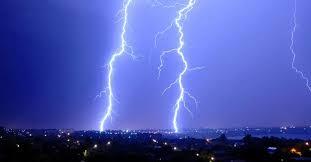Thundering Question 1
In a coastal area, after which day can we mostly expect a thunder to occur?
-
Day here means till evening. The thunders can occur at night or at dusk.

Try my World of Physics to solve many problems like this one. Also check Thundering Question - 2
This section requires Javascript.
You are seeing this because something didn't load right. We suggest you, (a) try
refreshing the page, (b) enabling javascript if it is disabled on your browser and,
finally, (c)
loading the
non-javascript version of this page
. We're sorry about the hassle.
Hot weather causes surface water to evaporate into the atmosphere.
As the warm air continues to rise, the water droplets combine to create larger droplets which freeze to form ice crystals. As result of circulating air in the clouds, water freezes on the surface of the droplet or crystal.
Eventually the droplets become too heavy to be supported by air and they fall. As the droplets move through the cloud, they pick up a negative charge by rubbing against smaller positively charged ice crystals.
The negative charge is attracted to the Earth's surface and other clouds and objects and when the attraction becomes too strong, the positive and negative charges come together, or discharge, to balance the difference in a flash of lightning (sometimes known as a lightning strike or lightning bolt).
The rapid expansion and heating of air caused by lightning produces the accompanying loud clap of thunder.